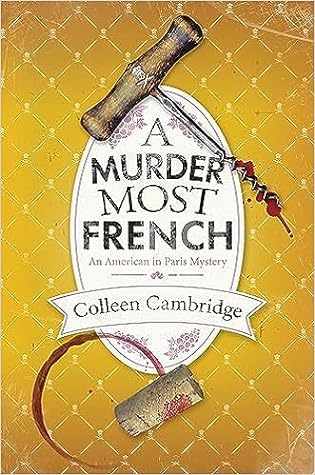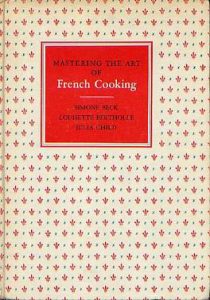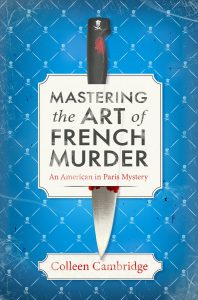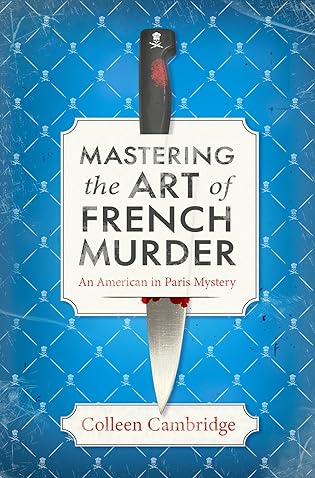 A Murder Most French (American In Paris Mystery, #2) by Colleen Cambridge
A Murder Most French (American In Paris Mystery, #2) by Colleen Cambridge Format: eARC
Source: supplied by publisher via Edelweiss
Formats available: hardcover, ebook, audiobook
Genres: culinary mystery, foodie fiction, historical mystery, mystery
Series: American in Paris Mystery #2
Pages: 272
Published by Kensington on April 23, 2024
Purchasing Info: Author's Website, Publisher's Website, Amazon, Barnes & Noble, Kobo, Bookshop.org, Better World Books
Goodreads
Postwar Paris is surging back to life, and its citizens are seizing every opportunity to raise a glass or share a delicious meal. But as American ex-pat Tabitha Knight and chef-in-training Julia Child discover, celebrations can quickly go awry when someone has murder in mind . . .
The graceful domes of Sacré Coeur, the imposing cathedral of Notre Dame, the breathtaking TourEiffel . . . Paris is overflowing with stunning architecture. Yet for Tabitha Knight, the humble building that houses the Cordon Bleu cooking school, where her friend Julia studies, is just as notable. Tabitha is always happy to sample Julia’s latest creation and try to recreate dishes for her Grand-père and Oncle Rafe.
The legendary school also holds open demonstrations, where the public can see its master chefs at work. It’s a treat for any aspiring cook—until one of the chefs pours himself a glass of wine from a rare vintage bottle—and promptly drops dead in front of Julia, Tabitha, and other assembled guests. It’s the first in a frightening string of poisonings that turns grimly personal when cyanide-laced wine is sent to someone very close to Tabitha.
What kind of killer chooses such a means of murder, and why? Tabitha and Julia hope to find answers in order to save innocent lives—not to mention a few exquisite vintages—even as their investigation takes them through some of the darkest corners of France’s wartime past . . .
My Review:
According to Julia Child, “The only real stumbling block is fear of failure. In cooking you’ve got to have a what-the-hell attitude.”
While Child absolutely did say that, she certainly hadn’t said it yet at in 1950, the time this second book in the American in Paris Mystery series takes place, directly after the events of the first book in this delicious historical mystery series, Mastering the Art of French Murder.
 Julia Child is too busy learning French cooking, living her larger-than-life life in Paris AND at the beginning of writing her masterpiece, Mastering the Art of French Cooking, when this series takes place.
Julia Child is too busy learning French cooking, living her larger-than-life life in Paris AND at the beginning of writing her masterpiece, Mastering the Art of French Cooking, when this series takes place.
Meaning that Julia – as much as she steals every scene in which she appears – is not the amateur detective protagonist of this series, even if she is every bit as much an American in post-war Paris as her best (fictional) friend Tabitha Knight.
Tabi probably would not entirely agree with that opening quote from Julia. It’s not fear of failure that dooms so many of Tabi’s cooking forays, it’s the fear of disappointing – yet again – her two messieurs, her elderly grandfather and his partner, her adopted Oncle Rafe.
Tabi does, however, most definitely have a what-the-hell attitude, but it seems to be increasingly focused, not on cooking but on murder. Not committing them, of course, but solving them. It’s an attitude that is immeasurably helped by just how many corpses she seemingly trips over.
The way that corpses seem to follow in her wake, and her inability to ignore the clues that bubble up before her, unfortunately looks like it’s helping police judiciaire Inspecteur Étienne Merveille into entirely too many headaches, if not an early ulcer.
Because somehow, no matter how many times Merveille warns her away, when Tabi rushes in where even angels would fear to tread, Merveille is always on hand to rescue her.
Maybe Tabi is following Julia’s three-part plan for managing men after all – no matter how many times the lady protests too much otherwise.
 Escape Rating A+: If you loved the first book in this series – and who didn’t? – you will run, not walk to get this second book because it’s every bit as charming as the first. If you still need a bit of convincing, I’m going to get right to that.
Escape Rating A+: If you loved the first book in this series – and who didn’t? – you will run, not walk to get this second book because it’s every bit as charming as the first. If you still need a bit of convincing, I’m going to get right to that.
But before I do, if you haven’t read Mastering the Art of French Murder and aren’t sure whether you can start the series here – you can. Everything you need to catch up does get enough of an explanation to make it work. Howsomever, that first book is delightful and delicious so even if you do start here you’ll want to go there immediately afterwards!
Yes, this review is full of squee. It’s that kind of book and that kind of series.
This time around, Tabitha gets involved in the case not because she’s a suspect, but because the murder happens literally right before her eyes – as does the second murder. Also before Julia’s eyes as well, and she absolutely can’t resist egging Tabitha on whenever she falters in her determination the least little bit.
Which is pretty much true for Julia all the way around.
The case is a twisted puzzlement – but in it’s ever increasing list of victims and in its choice of methods. Increasing both Tabitha’s and the reader’s fascination is the way that the string of murders links back to the late war, the simmering resentments of the surviving Resistance fighters and the blot on the French psyche that the collaborators represent.
Then the whole thing dives into the catacombs. Literally as well as figuratively, and the secrets that are hidden among the bones – not all of which are ancient.
When her messieurs receive a beautifully wrapped bottle of pilfered, poisoned wine – just as the first two victims did, Tabitha throws aside her remaining qualms and cautions to throw herself into an investigation that gets her thrown into the pitch black darkness of the catacombs.
Tabitha rescues herself – which is definitely part of her charm for this reader – but she’s afraid she won’t be able to run across Paris fast enough to save her messieurs. Fortunately for Tabi, her apple didn’t fall far from the family tree – and Inspecteur Merveille has been following her a LOT more closely than she imagined.
Their relationship – whatever it might turn out to be – is one of the teasingly dangling threads left at the end of this book. The mystery gets tidily wrapped up, but nearly everyone in Tabi’s life seems to think that Merveille has a tendre for her that would be worth exploring.
If it’s not obvious from all the squeeing, I would love for there to be a third book in this series and possibly more. For one thing, I have to see if Tabitha continues to follow that three-part plan of Julia’s for managing men. Tabi has the first part completed, as she actually managed to feed the man a surprisingly edible – for her at least – Croque Monsieur albeit without the bechamel sauce. Step two in Julia’s plan is to flatter the man which should be easy enough to do as he just saved her life and is quite competent at everything she’s seen of him so far.
Tabitha should have plenty of opportunities as the series continues – which I am oh so hopeful that it will. Because it looks as if investigating murders is looking more and more like it’s Tabitha’s answer to one of Julia’s instructions, to “find something you’re passionate about and keep tremendously interested in it.”
“Bon appetit!”

 Mastering the Art of French Murder (An American In Paris, #1) by
Mastering the Art of French Murder (An American In Paris, #1) by  And then there’s Julia Child herself, much too boisterous to ever be considered merely a secondary character and certainly not a sidekick, who draws readers in with her true-to-life mannerism, her real, documented history working for the OSS in the war, and her larger-than-life presence on so many wonderful pages of this story.
And then there’s Julia Child herself, much too boisterous to ever be considered merely a secondary character and certainly not a sidekick, who draws readers in with her true-to-life mannerism, her real, documented history working for the OSS in the war, and her larger-than-life presence on so many wonderful pages of this story.